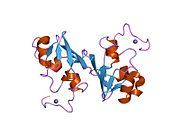GMEB1
Appearance
(Redirected from GMEB1 (gene))
Glucocorticoid modulatory element-binding protein 1 is a protein that in humans is encoded by the GMEB1 gene.[5][6][7]
Function
[edit]This gene is a member of KDWK gene family. The product of this gene associates with GMEB2 protein, and the complex is essential for parvovirus DNA replication. Study of rat homolog implicates the role of this gene in modulation of transactivation by the glucocorticoid receptor bound to glucocorticoid response elements. Two alternative spliced transcript variants encoding different isoforms exist.[7]
Interactions
[edit]GMEB1 has been shown to interact with TRIM63.[8]
References
[edit]- ^ a b c GRCh38: Ensembl release 89: ENSG00000162419 – Ensembl, May 2017
- ^ a b c GRCm38: Ensembl release 89: ENSMUSG00000028901 – Ensembl, May 2017
- ^ "Human PubMed Reference:". National Center for Biotechnology Information, U.S. National Library of Medicine.
- ^ "Mouse PubMed Reference:". National Center for Biotechnology Information, U.S. National Library of Medicine.
- ^ Thériault JR, Charette SJ, Lambert H, Landry J (Jul 1999). "Cloning and characterization of hGMEB1, a novel glucocorticoid modulatory element binding protein". FEBS Lett. 452 (3): 170–176. doi:10.1016/S0014-5793(99)00634-1. PMID 10386584. S2CID 20049223.
- ^ Christensen J, Cotmore SF, Tattersall P (Nov 1999). "Two new members of the emerging KDWK family of combinatorial transcription modulators bind as a heterodimer to flexibly spaced PuCGPy half-sites". Mol Cell Biol. 19 (11): 7741–50. doi:10.1128/MCB.19.11.7741. PMC 84824. PMID 10523663.
- ^ a b "Entrez Gene: GMEB1 glucocorticoid modulatory element binding protein 1".
- ^ McElhinny AS, Kakinuma K, Sorimachi H, Labeit S, Gregorio CC (2002). "Muscle-specific RING finger-1 interacts with titin to regulate sarcomeric M-line and thick filament structure and may have nuclear functions via its interaction with glucocorticoid modulatory element binding protein-1". J Cell Biol. 157 (1): 125–136. doi:10.1083/jcb.200108089. PMC 2173255. PMID 11927605.
Further reading
[edit]- Jimenez-Lara AM, Heine MJ, Gronemeyer H (2000). "Cloning of a mouse glucocorticoid modulatory element binding protein, a new member of the KDWK family". FEBS Lett. 468 (2–3): 203–210. doi:10.1016/S0014-5793(00)01209-6. PMID 10692587.
- Zeng H, Kaul S, Simons SS (2000). "Genomic organization of human GMEB-1 and rat GMEB-2: structural conservation of two multifunctional proteins". Nucleic Acids Res. 28 (8): 1819–1829. doi:10.1093/nar/28.8.1819. PMC 102812. PMID 10734202.
- Kaul S, Blackford JA, Chen J, Ogryzko VV, Simons SS (2000). "Properties of the glucocorticoid modulatory element binding proteins GMEB-1 and -2: potential new modifiers of glucocorticoid receptor transactivation and members of the family of KDWK proteins". Mol. Endocrinol. 14 (7): 1010–1027. doi:10.1210/mend.14.7.0494. PMID 10894151.
- Burnett E, Christensen J, Tattersall P (2002). "A consensus DNA recognition motif for two KDWK transcription factors identifies flexible-length, CpG-methylation sensitive cognate binding sites in the majority of human promoters". J. Mol. Biol. 314 (5): 1029–1039. doi:10.1006/jmbi.2000.5198. PMID 11743720.
- Kaul S, Blackford JA, Cho S, Simons SS (2002). "Ubc9 is a novel modulator of the induction properties of glucocorticoid receptors". J. Biol. Chem. 277 (15): 12541–12549. doi:10.1074/jbc.M112330200. PMID 11812797.
- Surdo PL, Bottomley MJ, Sattler M, Scheffzek K (2004). "Crystal structure and nuclear magnetic resonance analyses of the SAND domain from glucocorticoid modulatory element binding protein-1 reveals deoxyribonucleic acid and zinc binding regions". Mol. Endocrinol. 17 (7): 1283–1295. doi:10.1210/me.2002-0409. PMID 12702733.
- Colland F, Jacq X, Trouplin V, Mougin C, Groizeleau C, Hamburger A, Meil A, Wojcik J, Legrain P, Gauthier JM (2004). "Functional proteomics mapping of a human signaling pathway". Genome Res. 14 (7): 1324–1332. doi:10.1101/gr.2334104. PMC 442148. PMID 15231748.
- Tsuruma K, Nakagawa T, Shirakura H, Hayashi N, Uehara T, Nomura Y (2005). "Regulation of procaspase-2 by glucocorticoid modulatory element-binding protein 1 through the interaction with caspase recruitment domain". Biochem. Biophys. Res. Commun. 325 (4): 1246–1251. doi:10.1016/j.bbrc.2004.10.145. PMID 15555560.
- Rual JF, Venkatesan K, Hao T, Hirozane-Kishikawa T, Dricot A, Li N, Berriz GF, Gibbons FD, Dreze M, Ayivi-Guedehoussou N, Klitgord N, Simon C, Boxem M, Milstein S, Rosenberg J, Goldberg DS, Zhang LV, Wong SL, Franklin G, Li S, Albala JS, Lim J, Fraughton C, Llamosas E, Cevik S, Bex C, Lamesch P, Sikorski RS, Vandenhaute J, Zoghbi HY, Smolyar A, Bosak S, Sequerra R, Doucette-Stamm L, Cusick ME, Hill DE, Roth FP, Vidal M (2005). "Towards a proteome-scale map of the human protein-protein interaction network". Nature. 437 (7062): 1173–1178. Bibcode:2005Natur.437.1173R. doi:10.1038/nature04209. PMID 16189514. S2CID 4427026.
- Tsuruma K, Nakagawa T, Morimoto N, Minami M, Hara H, Uehara T, Nomura Y (2006). "Glucocorticoid modulatory element-binding protein 1 binds to initiator procaspases and inhibits ischemia-induced apoptosis and neuronal injury". J. Biol. Chem. 281 (16): 11397–11404. doi:10.1074/jbc.M510597200. hdl:2115/8511. PMID 16497673.
- Beausoleil SA, Villén J, Gerber SA, Rush J, Gygi SP (2006). "A probability-based approach for high-throughput protein phosphorylation analysis and site localization". Nat. Biotechnol. 24 (10): 1285–1292. doi:10.1038/nbt1240. PMID 16964243. S2CID 14294292.







